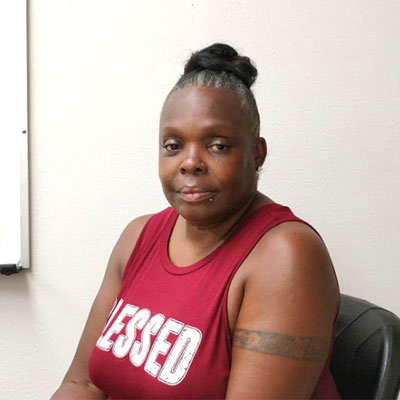Pima Eviction Legal Services Program works with tenants
The way Andrew Flagg sees it, when renters face off against landlords in eviction legal proceedings, it’s usually a David vs. Goliath battle. Although David was victorious in the Bible, the story is memorable because Goliath normally wins almost every time.
Flagg, a deputy director in Pima County’s Department of Community & Workforce Development, oversees the Emergency Eviction Legal Services, or EELS, program, which aims to give renters — the Davids of the world — a bigger and better slingshot.
EELS, which is funded almost entirely by American Rescue Plan Act Coronavirus State and Local Fiscal Recovery Funds, gives renters facing eviction access to lawyers who they otherwise would not be able to afford. With the aid of that legal assistance, renters are better able to make their cases in court and increase the possibility of staying in their homes.
“I really view the legal-representation component of EELS as leveling the playing field,” said Flagg, who is a licensed attorney. “You have a population that is basically going into a courtroom without any representation or advocacy at all.
“Historically, almost all landlords are represented and almost all tenants are unrepresented.”
Since starting operations on Aug. 2, 2021, EELS has been making a difference for renters in the courtroom. In 115 cases where EELS intervention has resulted in full legal representation, 57% of cases have ended favorably for tenants, either through dismissal of the eviction case, a settlement or a judgment in favor of the renter.
Landlords were victorious in 37% of cases and 6% were still pending a resolution.
Those numbers show the playing field has indeed been leveled.
“We’re not succeeding in all cases, but we’re able to help divert an awful lot of folks away from either being evicted or, for those who are evicted, from losing housing because we can find another housing resource for them,” Flagg said.
That’s because EELS offer more than just legal protection. It makes use of other Pima County programs such as rental assistance, job training and utility assistance to get people back on their feet and keep them there for the long term.
In fact, only about 10% of clients who come in contact with the EELS program ever require full representation in the courtroom. The vast majority of clients may require only a brief consultation with a lawyer or are helped in other ways, usually through assistance that helps them catch up with rent and utility payments.
The County has three full-time “navigators” who reach out to clients when their names show up on court filings for eviction proceedings or when they call the EELS hotline at (520) 724-EELS (3357) or use the website. Those navigators check to see if the clients are eligible for legal services based on their household incomes — which must be at or below 80% of the area’s median income.
Clients who qualify based on income may then be referred to one of three law firms or a nonprofit that have contracted with the County to provide eviction-related legal services.
Even if clients don’t qualify for legal services, they can still be referred to County or community agencies that can offer rent and utility assistance, job training, food aid or any other services they may require.
“The thing people need to know about EELS is that we don’t just offer a possible immediate fix but a wrap-around fix, and by that I mean that if you’re having an issue with rent there are probably other issues going on,” said Chula Robertson, one of the EELS navigators. “So, we try to address those needs as well.”
Robertson said many of the clients she sees mainly need rent and utility assistance, especially if they’ve lost a job or hours at work due to COVID-19 issues with themselves or their families. Some clients, especially those who are younger, may also need help finding a new job or improving their skills to get a better-paying job.
One case in particular stood out for Robertson.
She recalled a young couple in their 20s and with two young children who were served with an eviction notice. The couple didn’t require legal aid, but rental assistance put them back on track.
“We got them rental assistance and then they kind of disappeared on me, so I just hoped that everything was good,” Robertson said. “Then, just randomly two days before Christmas, I got a text message from the wife. My heart sank at first because normally people only reach out to us when something terrible has happened.
“But actually she sent me pictures of her kids hanging Christmas ornaments. That was really cool that they had a happy Christmas and things are going to be OK. And she actually got a job through another County program.”
Flagg, the EELS director, said the program is helping more than 300 households a month, either through legal services or by referring them to a host of other Pima County assistance programs.
“The impact of the program is approaching the eviction process as a whole and providing resources across the whole continuum, from beginning to end,” Flagg said. “And for those who need it, we are also able to offer them legal counsel, which wasn’t available before.”
Sorry, the comment form is closed at this time.


